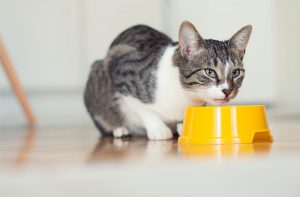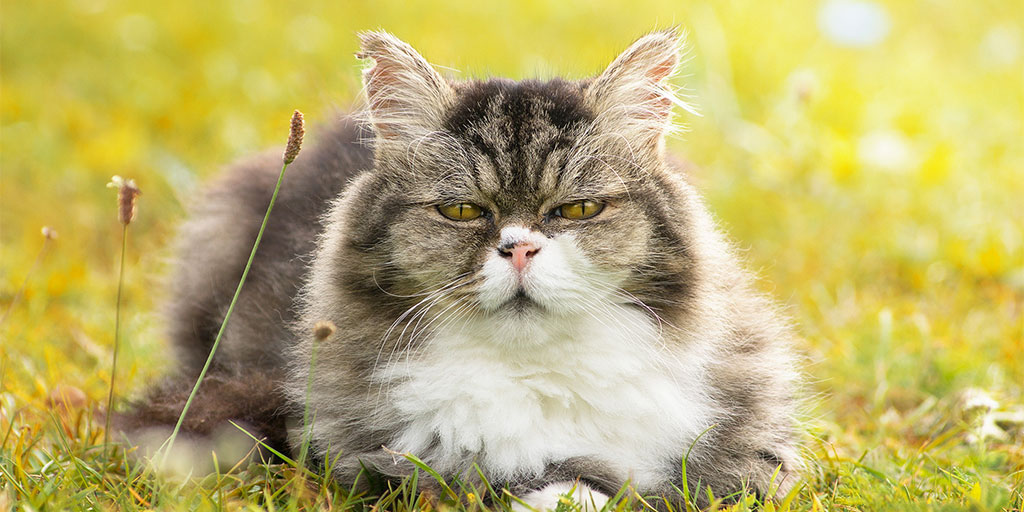The life expectancy of our feline friends is increasing, with cats able to live well into their teens – and sometimes even older!
As your cat reaches its senior years (typically regarded as being 11 years and over), they will require some extra care and attention to stay healthy.
Here’s our top tips for caring for your senior cat and keeping them happy and comfortable as they move into their golden years.
Regular preventative health checks are key
Even if your cat seems perfectly healthy, it’s still important to book in regular check-ups with your vet. It is inevitable that your cat will develop health issues during their lifetime, especially as they enter their senior years. However, many of these illnesses and diseases can either be avoided – or lessened – with some preventative actions. Your vet will be able to recommend how best to keep your kitty in tip top shape, and how often they need a health check, taking into account their age, lifestyle, and any pre-existing conditions.
Make dental health a priority
Dental disease is very common amongst older felines. In fact, after the age of 4, most cats will develop dental issues. If left untreated, this can lead to severe disease and infections, and may prevent them from eating properly. During your cat’s regular check-ups, your vet will thoroughly check for any signs of dental disease and will advise if your cat needs any dental work conducted, such as a dental clean or teeth extraction.
If your cat needs a dental procedure, your vet will undertake blood tests first to ensure they are fit for surgery. While every procedure has some degree of risk, modern anaesthesia and monitoring systems means that being sedated is safer than ever.
Brushing your cat’s teeth regularly and keeping an eye out for any evidence of dental problems – such as drooling, really bad breath or problems chewing – will all help to keep your cat’s teeth nice and healthy.
Review their diet
There are plenty of food options available for senior kitties which typically include higher levels of protein, however it’s important to discuss your cat’s nutritional requirements with your vet.
Cats can sometimes become a little fussy with their food as they get older as their sense of taste and smell can weaken. Offering your cat multiple small meals, a day and warming their food up can help to make mealtime more appetising.
Adapt your home environment
Changing a few small things in your home can make a huge difference for an ageing cat.
- Bedding: Older cats tend to sleep more, so it’s important that you offer multiple comfy places for them to take a nap. Place the beds in quiet places where other pets or small children won’t disturb them, and make sure they can easily access them – add stairs or a ramp if they are finding it hard to get to their bed.
- Litter boxes: The best litter box for a senior cat is one that is large and has low sides. Outside cats may not feel as safe to toilet outside as they get older, so it’s worth providing one or two for inside the house.
- Food and water bowls: If your cat is used to being fed on a table or benchtop, once they hit senior age it might be best to move their food and water bowls to the floor. You may even want to consider investing in some elevated bowls to make it even easier for your cat to eat and drink.
Help with grooming
Older cats can have trouble grooming themselves as effectively as they could when they were younger. Grooming plays an important role in keeping their skin healthy, regulating their temperature, and stimulating circulation – so if your senior cat is having trouble with grooming, you may need to give them a hand.
With shorthaired cats, a gentle brush every day is all that is typically needed, along with cleaning around their eyes, nose, and bottom. Longhaired kitties need extra grooming attention and may require regular trips to a professional groomer, as their fur can get severely matted which can become very uncomfortable.
 Things to look out for
Things to look out for
As your cat enters their senior years, you will often see some changes in their behaviour. This can be due to physiological changes taking place due to ageing, or potentially an early sign of disease or illness.
Cats are particularly good at hiding symptoms of illness, so it’s important that you look out for any changes in their behaviour, appearance, or daily habits, and discuss these with your vet.
Key things to look out for include:
- Weight loss or gain
- Change in appetite or increased thirst
- Vomiting
- A change in temperament such as hiding or aggression
- Changes in toileting habits, including going outside the litterbox or straining
- Difficulty going upstairs or jumping
- Overgrooming
Our dedicated vets are here to help
A large number of diseases and illnesses can be treated and well managed if caught early enough. Regular health checks for your senior cat can help address any potential health issues and keep your kitty comfortable and happy as they move into their golden years.
We’d love to get to know your cat and help them living a long and healthy life. To make an appointment with one of the vets at our small animal clinic, you can book online or call 08 8318 1801.



